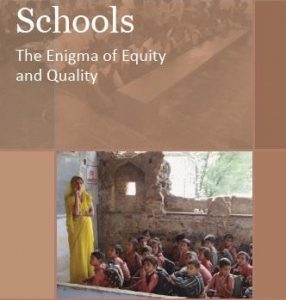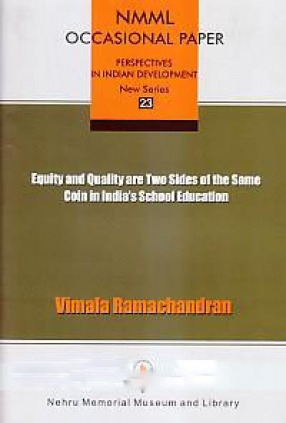This book examines the elementary education 'system' i.e. the institutional structures, processes and dynamics that frame it. It unravels and analyses the inability of the system to achieve high quality education for all. Though the contexts of social inequity, poverty and illiteracy in which schools are situated need to be keep in view, the authors argue that the institutional structures, processes and dynamics play a critical role in terms of the extent to which quality and equity in education are promoted, or the existing social context is reproduced. Therefore, the education system needs to be scrutinised in detail. A range of institutions at the apex and field level that frame elementary education in India are examined through an in-depth investigation across two states encompassing management processes, pedagogic ideas and practices, issues related to equity and financing of education. This investigation facilitates the location of core issues that lie at the heart of the inadequacies that pervade the elementary education system, i.e., hierarchical and 'command style functioning', rigidities and the play of patronage and rent-seeking; a lack of a meaningful discourse about education and learning; poor capacities in the pedagogic sphere as well as management; inadequate interventions to reduce inequity; and the existence of policies that reproduce inequities rather than countering them. The book makes the case for institutional reform for real change and improvemen. Based on rigorous fieldwork, this book will be of particular interest to those in education, public policy and administration, sociology, politics, South Asian Studies, and research methodology.
The Elementary Education System in India: Exploring Institutional Structures, Processes and Dynamics
$52.20
$58.00
In stock
Free & Quick Delivery Worldwide
All orders amounting to US$ 50 or more qualify for Free Delivery Worldwide. For orders less than US$ 50, we offer Standard Delivery at $14 per book.
ABOUT THE AUTHOR Rashmi Sharma
Dr. (Mrs.) Rashmi Sharma is a National Scholarship holder having a throughout First Class career. She obtained her Master's Degree in Gandhian and Peace Studies and Doctorate from Panjab University, Chandigarh. Her earlier work 'Gandhian Economics: A Humane Approach' has been widely acknowledged as a scholarly work of great value. She has published a number of research papers in various journals of repute. She was awarded the Senior Fellowship of Indian Council of Historical Research, New Delhi.
ABOUT THE AUTHOR Vimala Ramachandran
Vimala Ramachandran is Director, Educational Resource Unit, Jaipur and Delhi, a research and consulting group which she established in 1998. She is also a co-founder and Managing Trustee of Health Watch Trust – a network of NGOs, researchers and institutions working on issues related to women’s health, gender, population and development. She began her career teaching Indian politics and political philosophy at a women’s college in Delhi University. Leaving the groves of academe, Vimala Ramachandran worked with the Department of Education, Government of India, from 1987 to 1993 to design an education programme for adult women called Mahila Samakhya – Education for Women’s Equality. She established this programme in Karnataka, Uttar Pradesh and Gujarat. Thereafter, Ms Ramachandran has been an independent development consultant and researcher. Besides writing reports and contributing chapters to edited volumes, she has previously edited Bridging the Gap between Intention and Action: Girls’s and Women’s Education in South Asia (1999) and Getting Children Back to School – Case Studies in Primary Education (Sage, 2003). She writes regularly on education in The Hindu and Economic and Political Weekly.
reviews
0 in total
Review by Anonymous
The Elementary Education System in India: Exploring Institutional Structures, Processes and Dynamics
Be the first to review “The Elementary Education System in India: Exploring Institutional Structures, Processes and Dynamics” Cancel reply
You must be logged in to post a review.
Bibliographic information
Title
The Elementary Education System in India: Exploring Institutional Structures, Processes and Dynamics
Author
Edition
Ist ed.
Publisher
ISBN
415483285
Length
xix+346 p., Tables; Figures.
Subjects
more by Rashmi Sharma see more
The Practical Book of Rriki: Healing Through Universal Lifeforce Energy
Find balance and harmony in ...
$17.10
$19.00











There are no reviews yet.